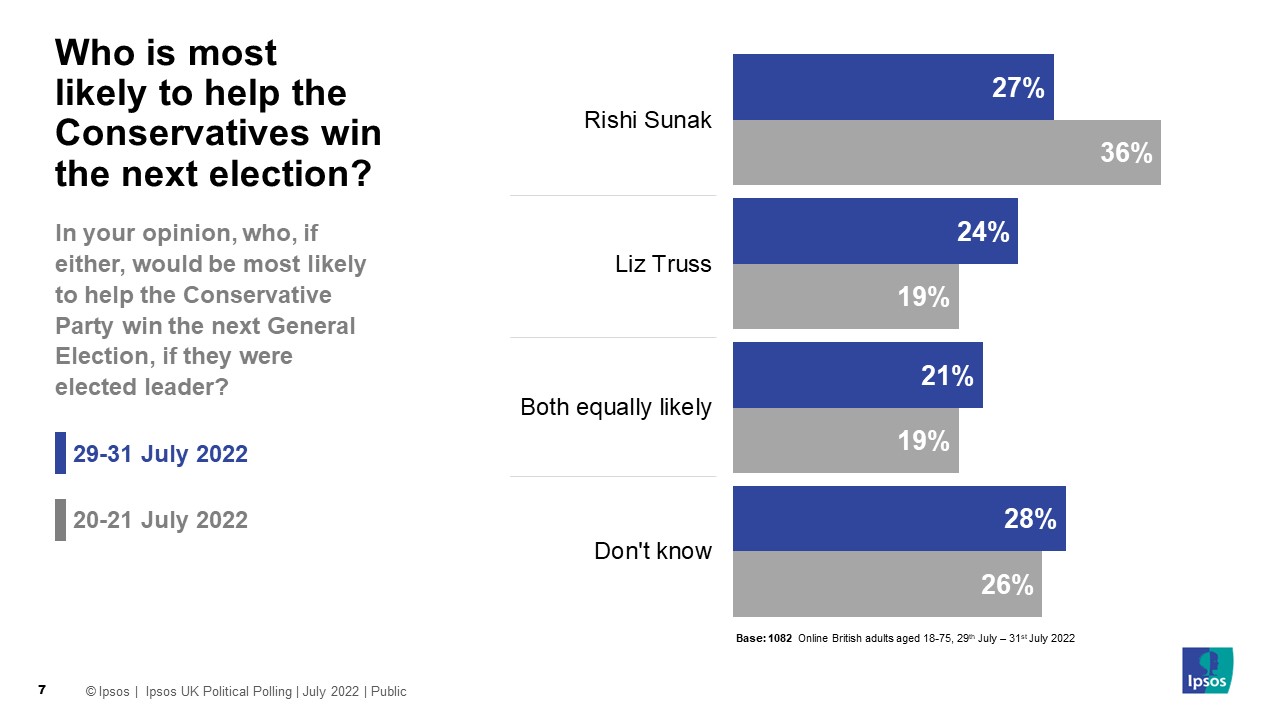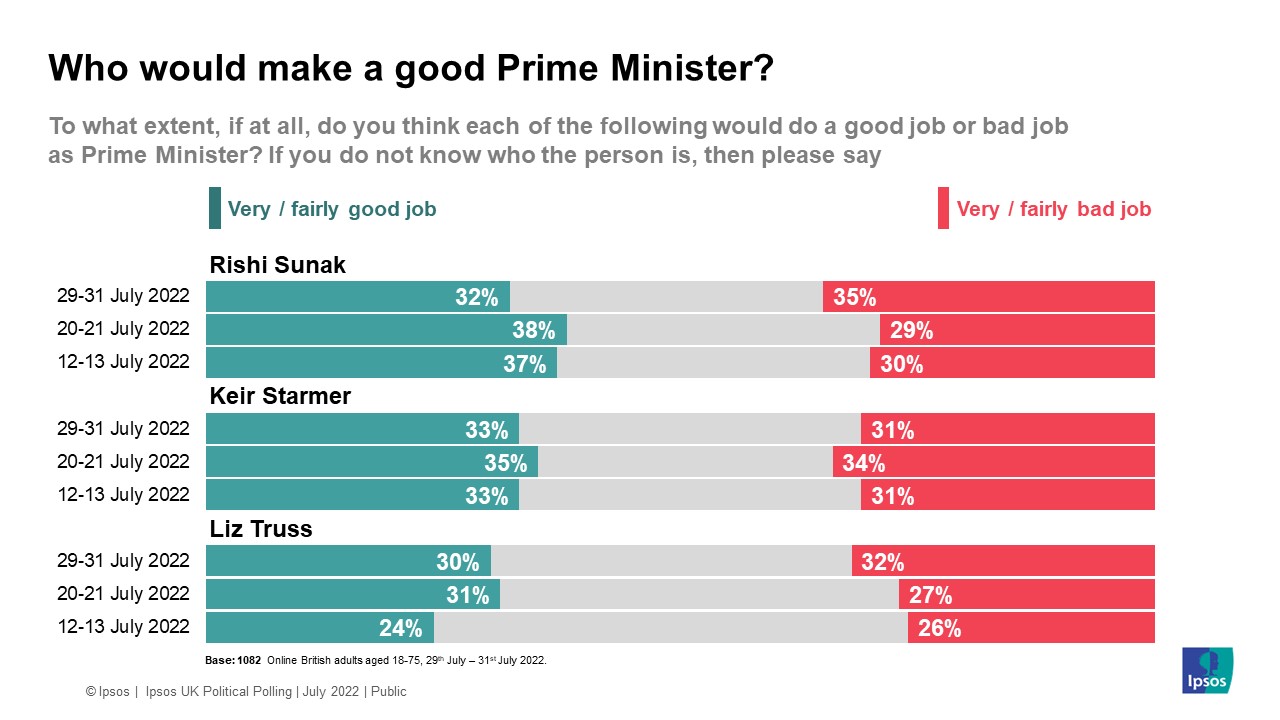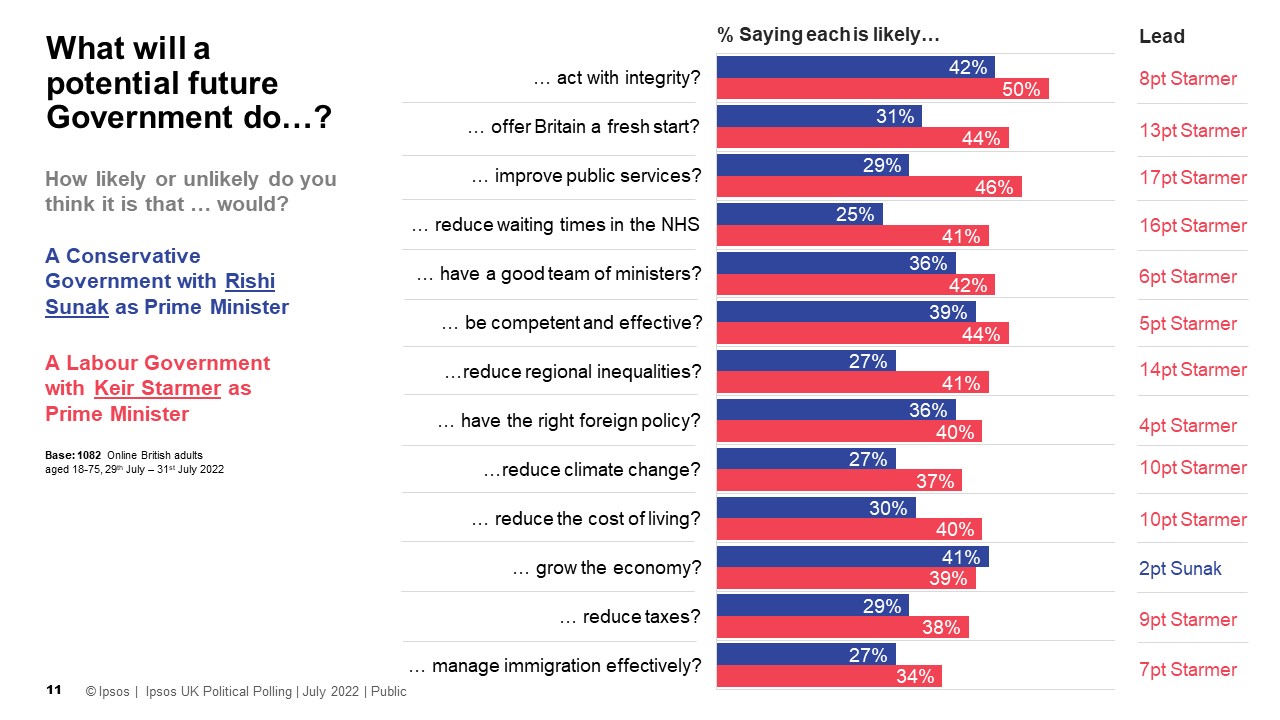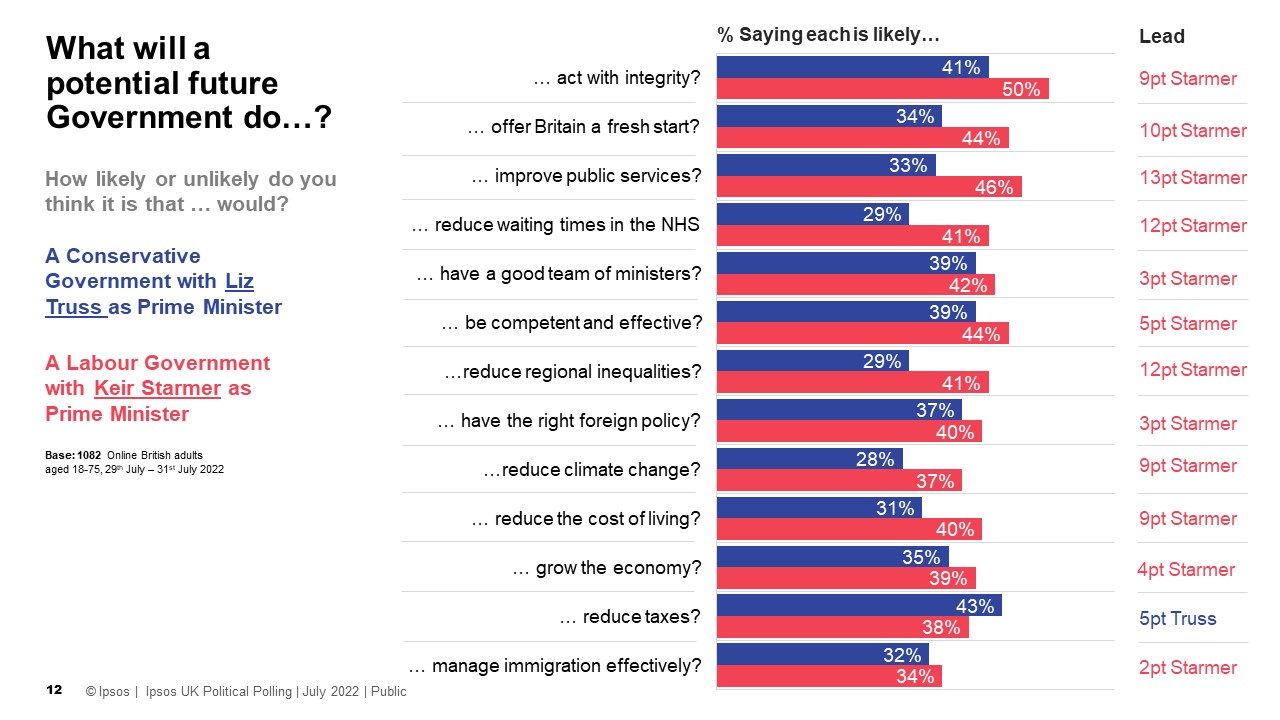Rishi Sunak losing ‘electability’ advantage over Liz Truss according to public
New research by Ipsos, taken July 29th-31st, asked the public how closely they were following the Conservative leadership contest, how much they knew about the final two candidates, whether each would be a good or bad Prime Minister, who would be most likely to win a General Election and how likely a government led by either would deliver on a range of topics. Similar questions were asked about Labour leader Keir Starmer too.
Would Sunak or Truss be more likely to win a General Election?
Rishi Sunak has lost an advantage he held with the public 10 days earlier on whether he or Liz Truss were most likely to lead the Conservatives to a General Election victory.
Now, 27% think Sunak would be more likely to lead the Conservatives to win a General Election, 24% say Liz Truss, whilst 21% think they would be equally likely and 28% say they don’t know. Earlier in July, Sunak led by + 17 pts.

- A similar pattern emerges when looking at 2019 Conservative voters. 32% of those voting Conservative in 2019 think Rishi Sunak would be most likely to lead the Conservatives to victory at the next General Election, 34% say Liz Truss. Earlier in July, Sunak led by 12 points (41% vs 29%).
Would Sunak, Truss and Starmer make a good or bad PM?
- Overall, the public are more likely to know ‘a great deal’ or ‘a fair amount’ about Rishi Sunak (55%) and Keir Starmer (47%) than Liz Truss (40%). However, Liz Truss is becoming better known, with the proportion knowing ‘a great deal’ or ‘fair amount’ about her increasing 7 points since our last poll.
- 32% think Rishi Sunak would do a good job as PM (-6pts since earlier in July), 35% say bad job (+6 pts).
- 30% say Liz Truss would make a good PM (-1pt) and 32% say bad (+5pts).
- 33% say Keir Starmer would make a good PM (-2pts) and 31% say bad (-3pts).
- The fall in Sunak’s numbers may partially be driven by weakening perceptions amongst 2019 Conservative voters. In a poll taken 12-13 July, 55% of this group thought he would make a good PM, that figure is now 42%.

Sunak vs Starmer
- When asked how likely a Labour government with Starmer as Prime Minister would do things compared to a Conservative government under Rishi Sunak, we find that Starmer’s Labour leads in 12 out of 13 areas.
- The biggest leads for Starmer’s Labour occur on improving public services (+17pts) and reducing waiting times in the NHS (+16pts). Starmer’s Labour also leads on reducing the cost of living (+10pts), the most important issue on voters’ minds and enjoys double-digit leads on offering Britain a fresh start (+13), reducing regional inequalities / levelling-up (+14) and reducing climate change (+10).
- A Conservative government led by Sunak is most competitive on growth, with Sunak’s Conservatives leading Starmer’s Labour by 2 points in this area.

Truss vs Starmer
- When comparing a Labour government led by Starmer to a Conservative government led by Liz Truss, a similar pattern emerges. Starmer’s Labour leads in 12 of the 13 areas tested.
- Starmer’s Labour holds double-digit leads over Truss’ Conservatives in being seen as more likely to improve public services (+13pts), reduce waiting times in the NHS (+12), reduce regional inequalities / levelling-up (+12) and offering Britain a fresh start (+10).

- Meanwhile, Liz Truss’ Conservatives lead Starmer’s Labour on being more likely to cut taxes (+5 pts).
- When comparing Sunak to Truss we see few notable differences amongst the general public, other than Sunak leading Truss on growing the economy (+6) and Truss leading Sunak on cutting taxes (+14).
How closely are the public following the contest?
- 59% of Britons are following the Conservative Party leadership race closely (including 68% of those voting Conservative at the 2019 General Election). Overall, the proportion following the race closely is down 7 points from 66% earlier in July.
- Meanwhile, 70% are following the Russian invasion of Ukraine closely and 84% are following the rising cost of living closely.
- The Conservative leadership race is being followed by roughly the same number that are following possible future strike action by public sector workers (59%) or the rail strikes that took place the week of the poll (58%). 47% had been following the women’s euros and 25% the TV show love island.
Keiran Pedley, Director of Politics at Ipsos, said:
Any public perception that the Conservatives would be more likely to win a General Election under Rishi Sunak than Liz Truss appears to have disappeared. However, whoever wins faces a significant challenge in repairing the Conservative brand. The public are more likely to think a Starmer-led Labour government would reduce the cost of living and improve Britain’s public services – both key priorities for voters moving forward.
Technical note:
- Ipsos interviewed a representative quota sample of 1,082 adults aged 18-75 in Great Britain. Interviews took place on the online Omnibus on 29th- 31st July 2022. Data has been weighted to the known offline population proportions. All polls are subject to a wide range of potential sources of error.




